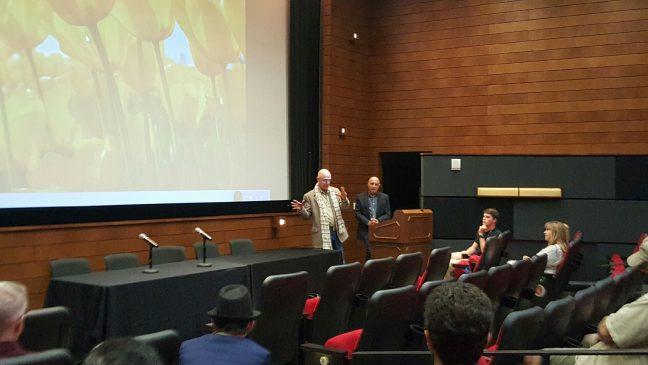Three volunteers in a recent University of Wisconsin study on the effects of psychedelics in healthy individuals shared their experience to a full house at The Marquee Theater in Union South Monday.
The research specifically explored the benefits of taking psilocybin, an illegal substance and active ingredient found in “magic mushrooms.”
Wisconsin Union Directorate Society and Politics Committee hosted the event in collaboration with Nicholas Cozzi, a pharmacologist in the School of Medicine and Public Health.
This was the first time WUD Society and Politics Committee showcased a study physically conducted on UW’s campus, director of the committee Zach Hanley said.
“[Our goal was to bring] an unknown topic to most people on campus and the Madison community,” Hanley said. “But it also highlights this really unique research happening on campus.”
A total of 12 diverse participants were selected after an extensive screening process to participate in the psychedelically-aided psychotherapy, Dan Muller, associate professor of rheumatology at UW and study guide said. In the UW psilocybin study, the participants took consistently higher doses of the drug in three separate sessions, which each lasted two hours. Before each session, the study participants engaged in therapy and trust-building sessions with the study guides.
The study volunteer panel said the drug had potential as a life-changing agent in healthy individuals.
Geoff Gilpin, an area author, said this study changed everything for him.
“It’s like going through a door,” he said. “You can’t go back the other way, but it’s a completely different life. I gained a strength, an inner peace and a sense of perspective that made it possible for me to survive what turned out to be the hardest year of my life.”
Gilpin said he still thinks a lot of misconceptions are held from the ’60s and the war on drugs. As study volunteers, he said they have a unique experience and perspective to share, especially to people in the public who might be hesitant about supporting psychedelic research.
Mazdak Bradberry, an MD, PhD candidate at UW, said the experience was unique in how personal and inwardly focused it was. He said it was not just the drug itself, but the psilocybin accompanied by the counseling, that made the experience so profound.
“It’s never the medicine itself, it is the medicine in the context of outstanding guidance that is full of wisdom,” Bradberry said. “So much of this I can’t parse out what was psilocybin or just part of the sessions.”
Diane Pasley, vice president and loan officer of Wisconsin Business Development, who was going through a divorce at the time of the study, found it to be encouraging and transformative.
Pasley said it helped her realize that while people need each other, she feels whole in herself as a person.
“Psychedelics aren’t the only way [to become more aware of reality], but I can [be more aware by] being in the study, like when I meditate now I know where to go,” she said. “People don’t have to take psychedelics, but doing anything to just kind of wake up I think is a good thing.”
Muller said there are other pathways to achieving the connectedness and peace the drug is capable of giving, like yoga or meditation. But he said he wants to see it as a viable alternative to current methods used to treat addiction, PTSD, anxiety and depression in the marketplace.
“In my mind, it is criminal that we’re not using it now,” Muller said.














